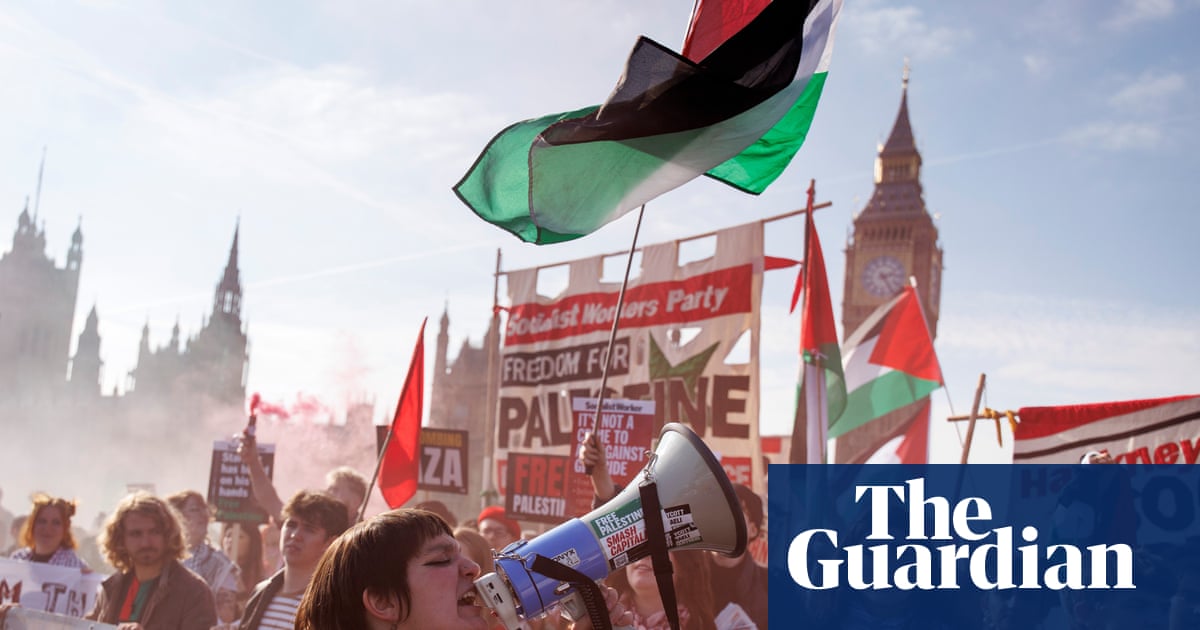The right to protest has come under sustained attack in the west, according to a report highlighting the growing criminalisation of pro-Palestinian demonstrations.
The study by the International Federation for Human Rights (FIDH) pays particular attention to the UK, the US, France and Germany, where it says governments have “weaponised” counter-terrorism legislation as well as the fight against antisemitism to suppress dissent and support for Palestinian rights in Gaza and the occupied West Bank.
“This trend reflects a worrying shift towards the normalisation of exceptional measures in dealing with dissenting voices,” said Yosra Frawes, the head of the Maghreb and Middle East desk at FIDH.
The report, which draws on open-source research, first-hand testimonies and reports from international bodies, comes a day after a US-sponsored plan led to a ceasefire in Gaza, the release of all living Israeli hostages and thousands of Palestinian prisoners held by Israel.
The research, which was conducted between October 2023 and September 2025, also raises questions over the censorship of public office holders, violations against journalists, civil society and academic freedom in the UK, France, Germany and the US.
“The right to protest has come under sustained attack from the British government across administrations and party lines,” says the report, which highlights government policies such as the anti-protest legislation put forward by the Conservative government in 2024 later found as unlawful, and a Labour government it claims “pushed to legitimise Israel’s genocidal violence” and “continued to justify support for Israel”.
It also cites statements made by the former Tory home secretary Suella Braverman, including calling the pro-Palestine demonstrations “hate marches”. It says the narrative stigmatised “support for Palestine and Palestinian resistance movements” and “worked to discriminate against Muslims and other racialised groups in the UK”.
The change to a Labour government in July 2024 did “little to change official government narratives”, according to the report, which says it continued to associate critique of Israel and support for Palestine with “violent antisemitism” and “targeted Muslim and racialised groups”.
Recent UK government figures have shown hate crimes against Muslims are up by nearly a fifth, after figures earlier this year revealed Islamophobic assaults surged by 73% in 2024. Antisemitic incidents in the UK have also increased, leading to a decrease in feelings of safety in the community, concerns of which were echoed by people at a 7 October memorial event in London. Two Jewish worshippers were killed at a Manchester synagogue earlier this month, in what authorities said was an Islamist-inspired terrorist attack.
As outrage at Israel’s war in Gaza continues to draw thousands of people to UK streets, the Labour government has met concerns of rising antisemitism and specific inflammatory chants at pro-Palestinian marches with the proscription of Palestine Action and proposed an increase in police powers at protests. The government recently condemned the rise in anti-Muslim hate crimes. However, community leaders have criticised a lack of response.
Last week, Keir Starmer’s plea for the cancellation of “un-British” demonstrations on the second anniversary of the 7 October attack was criticised by protest organisers as the conflation of the actions of Israel with Jewish people around the world. Civil liberties groups have also expressed concern over potential restrictions over the right to protest.
While laws around protest vary across the UK, US, France and Germany, with cultural contexts reflected in the legislation, the report says the violations within the four countries are also “representative of much broader trends” in the repression of Palestinian solidarity globally.
In the US, similar action in solidarity with Palestine has been met with arrests, legal action and mounting threats. In France, the government has been criticised for repressing those expressing solidarity with Palestinians, including banning demonstrations in certain cities as well as the decision to dissolve the pro-Palestinian human rights and solidarity collective Urgence Palestine.
And in Germany, where pro-Palestinian rallies have drawn thousands to the streets, under the shadow of the country’s postwar identity indelibly shaped by the Nazi regime’s responsibility for the Holocaust, tactics by police have been criticised as excessive and many have disputed the decision to ban certain slogans under the law as antisemitic.
The report recommends the UK establish an independent body to oversee policing practices during demonstrations, and overhaul section 12 of the Terrorism Act 2000 to exclude protected political opinions and solidarity slogans. It also recommends the repeal of section 11 of the Public Order Act 2023, which allows for suspicionless stop and searches during demonstrations.
“Ultimately, the crackdown on solidarity with Palestinians reveals a profound crisis, not only of human rights in the occupied territories but of freedom itself, in societies that claim to be democratic,” the report says.

